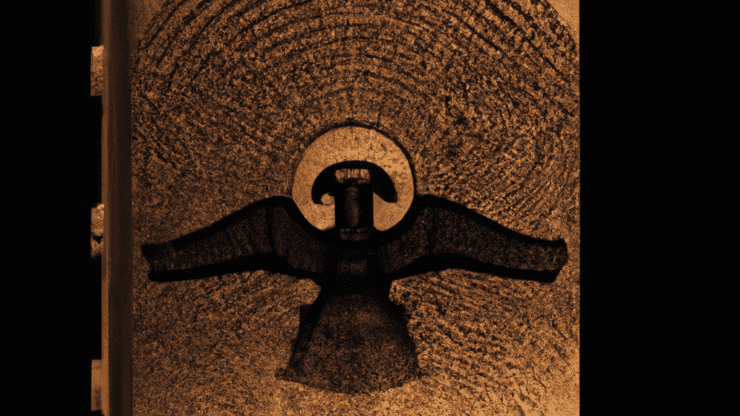The Bible is a book that has been studied for centuries, and while its teachings are widely known, there are still many mysteries surrounding its content.
One of these mysteries is the role of the Anunnaki in the Bible.
While many people may not have heard of the Anunnaki, they are a group that has been mentioned in ancient texts, and evidence suggests they may have played a significant role in shaping human history.
Jump to Section
Introduction
The Anunnaki are a group of deities that appear in the mythological traditions of the ancient Sumerians, Akkadians, and Babylonians.
They are often depicted as powerful beings that came down from the heavens to govern the earth and its inhabitants.
While their existence is still debated by scholars, evidence suggests that they may have played a role in the formation and interpretation of the Bible.
What are the Anunnaki?
The Anunnaki are often depicted as a group of deities that were worshipped by the ancient Sumerians, Akkadians, and Babylonians.
They were believed to have come from the heavens and were responsible for creating the earth and its inhabitants.
According to the ancient texts, the Anunnaki were powerful beings that possessed advanced knowledge and technology.
Why are the Anunnaki significant in the Bible?
While the Anunnaki are not directly mentioned in the Bible, there is evidence to suggest that they may have influenced the stories and teachings found within it.
Some scholars believe that the Anunnaki provided the inspiration for certain biblical stories, while others argue that they may have had a more direct role in shaping human history.
Overview of the Evidence
The evidence for the Anunnaki’s involvement in the Bible is based on a combination of archaeological discoveries, linguistic evidence, and mythological references.
These sources provide insights into the beliefs and practices of the ancient civilizations that worshipped the Anunnaki and suggest that their influence may have been more widespread than previously thought.
Anunnaki in Genesis
The book of Genesis is the first book of the Bible and contains two of the most well-known stories in the Bible: the creation story and the flood story.
Some scholars believe that the Anunnaki may have played a role in both of these stories.
Anunnaki in the Creation Story
The creation story in Genesis describes how God created the earth, animals, and humans in six days.
However, some scholars argue that the story bears similarities to the Sumerian creation myth, which describes how the gods, including the Anunnaki, created the earth and humans.
The similarities between the two stories have led some to suggest that the Anunnaki may have influenced the creation story found in Genesis.
Anunnaki in the Flood Story
The flood story in Genesis describes how God decided to flood the earth and start anew after becoming displeased with humanity’s actions.
However, some scholars argue that the flood story bears similarities to the Sumerian flood myth, which describes how the gods, including the Anunnaki, decided to flood the earth and start anew.
The similarities between the two stories have led some to suggest that the Anunnaki may have influenced the flood story found in Genesis.
Was Noah an Anunnaki hybrid?
Some scholars have suggested that Noah, the protagonist of the flood story in Genesis, may have been an Anunnaki hybrid.
According to this theory, the Anunnaki were a race of beings that interbred with humans, resulting in hybrids that possessed advanced knowledge and technology.
While this theory is still debated, it highlights the possibility that the Anunnaki may have had a more direct role in shaping human history.
Anunnaki in the Old Testament
The Old Testament contains numerous stories and teachings that some scholars believe may have been influenced by the Anunnaki.
Anunnaki and the Tower of Babel
The story of the Tower of Babel in Genesis describes how God confused the language of the people who were building the tower.
However, some scholars believe that the story bears similarities to the Sumerian myth of Enmerkar and the Lord of Aratta, which describes how the god Enki used his knowledge of language to disrupt the communication between two cities.
The similarities between the two stories have led some to suggest that the Anunnaki may have influenced the Tower of Babel story.
Anunnaki and the Nephilim
The Nephilim are a group of beings that are mentioned in the Old Testament and are often associated with the Anunnaki.
According to the Book of Genesis, the Nephilim were the offspring of the “sons of God” and the “daughters of men.” While the identity of the “sons of God” is still debated, some scholars believe that they may have been the Anunnaki.
Did the Anunnaki intervene in human affairs?
Some scholars believe that the Anunnaki may have intervened in human affairs, providing advanced knowledge and technology to certain individuals.
They argue that this knowledge and technology may have been responsible for the rapid advancement of human civilization in the ancient world.
Theories Surrounding the Anunnaki
The Anunnaki have been the subject of numerous theories, many of which suggest that they may have had a more direct role in shaping human history than previously thought.
Ancient Astronaut Theory
The ancient astronaut theory suggests that the Anunnaki were extraterrestrial beings that came to earth to help advance human civilization.
Proponents of this theory argue that the Anunnaki provided advanced knowledge and technology to humans, resulting in the rapid advancement of human civilization in the ancient world.
Sumerian Origins Theory
The Sumerian origins theory suggests that the Anunnaki were responsible for the creation of the Sumerian civilization, which is considered to be the first civilization in human history.
Proponents of this theory argue that the Anunnaki provided the Sumerians with advanced knowledge and technology, resulting in the rapid development of their civilization.
Anunnaki and the Alien Hybrid Agenda
Some theorists suggest that the Anunnaki may have had a more sinister agenda, involving the creation of human-alien hybrids.
According to this theory, the Anunnaki interbred with humans, resulting in the creation of hybrids that possessed advanced knowledge and technology.
These hybrids were then used to further the Anunnaki’s plans for human domination.
Evidence of Anunnaki Influence
The evidence for the Anunnaki’s influence on human history is based on a combination of archaeological discoveries, linguistic evidence, and mythological references.
Archaeological Discoveries
Archaeological discoveries have uncovered evidence of the worship of the Anunnaki in ancient Sumer, Akkad, and Babylon.
These discoveries include statues, tablets, and other artifacts that suggest that the Anunnaki were a significant part of these ancient civilizations.
Linguistic Evidence
Linguistic evidence suggests that the Sumerian language, which was spoken by the ancient Sumerians, may have been influenced by the Anunnaki.
Some scholars argue that the Sumerian language contains words and phrases that are related to the Anunnaki and suggest that their influence may have been more widespread than previously thought.
Mythological References
Mythological references to the Anunnaki can be found in the ancient texts of the Sumerians, Akkadians, and Babylonians.
These texts describe the Anunnaki as powerful beings that possessed advanced knowledge and technology and suggest that their influence may have been significant in shaping human history.
Conclusion
The evidence for the Anunnaki’s influence on human history is based on a combination of archaeological discoveries, linguistic evidence, and mythological references.
While their existence is still debated by scholars, evidence suggests that they may have played a significant role in shaping human history.
What does this mean for our understanding of the Bible?
It suggests that the stories and teachings found within the Bible may have been influenced by the Anunnaki, and that their role in human history may have been more significant than previously thought.
Greetings fellow space travelers, I am Draco Blaze, creator of Alienated Media who is passionate about exploring the unknown and writing about my experiences with extraterrestrial life.
My focus is on alien encounters and creating thought-provoking sci-fi short stories that transport readers to new worlds and realities.
Feel free to contact me at [email protected].





